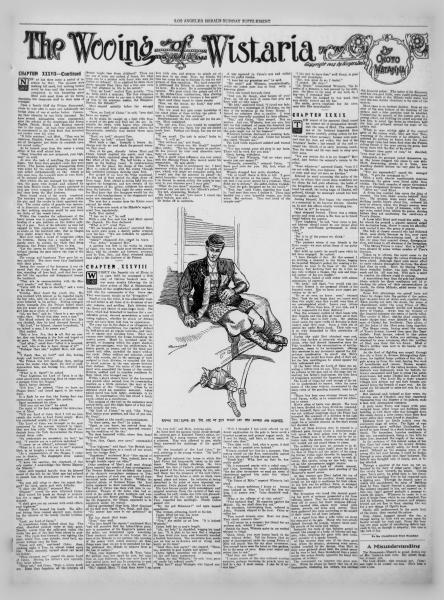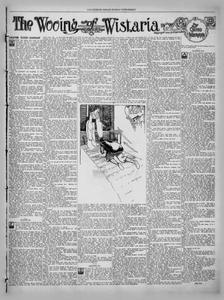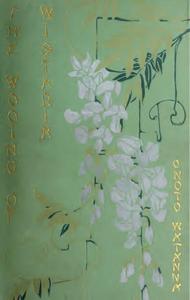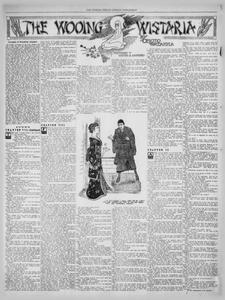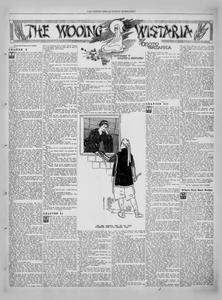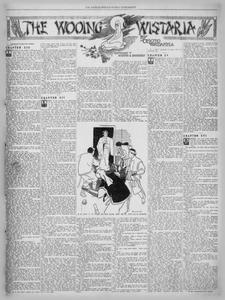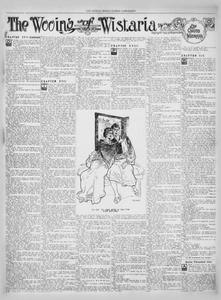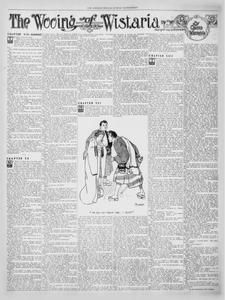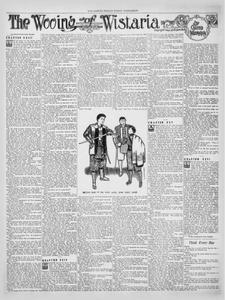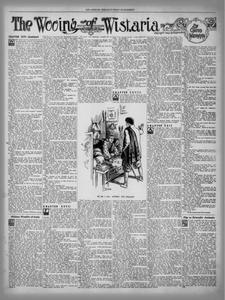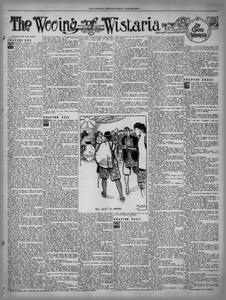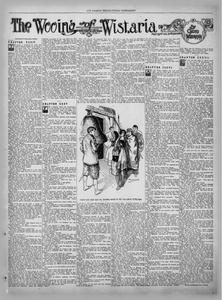Chapter XXXVII—Continued
Now at last there came a period of inaction for Mori. The pioneers were making full speed, but nothing further could be done until the trenches were completed. In this breathing space Mori rode apart from all his forces, dismissing his temporary staff to their tasks of oversight.
Upon a lonely bluff the Prince dismounted, where he was able to make out indistinctly the foreign ships of war at anchor below. Concerning their identity he was little informed. He knew several nationalities were represented, since the advent of the Americans had drawn English, Dutch, French and Russian men-of-war to the coast. At least four nations must be represented in the little fleet that stretched out yonder over the water.
“It little matters,” said Mori. “They may be American, English, French or Russian, but they are all foreigners and desire to encroach upon our sacred realm.”
As he turned away from the water a young officer of his staff saluted him.
“Many trenches are now prepared, your highness,” he said.
At once the task of installing the guns was begun. Out from their guarded circle they
were drawn. The horses originally transporting them were aided by the cavalry
mounts, while footmen pulled enthusiastically at the wheels as they sank into
the trampled mire or were blocked by natural obstructions.
Once within the pits destined for their reception, the guns were leveled and adjusted by men from Mori’s works. The crews appointed to each gun were composed of the followers who had come from the Mori fortress.
Dawn found much of the work completed. The trenches were fashioned, the guns within the pits and the cavalry in their appointed station. The outer cordon of guards was instructed to dismount and to recline, horse and man, so that nothing suspicious could be seen from the decks of the vessels below.
Within the trenches the adjustment of the heavy pieces was in progress, together with the leveling of a gun platform or the furtive sighting of a gun. Such of the infantry as were not engaged in this employment were thrown out as scouts on the landward side, that no Shogun force might attack them in the rear.
Mori now made a round of inspection within the fortress. Seeing that a number of the guards were in position for their final firing elevation, the Prince called Toro to him.
“Let the crews be drilled,” he ordered, “but without raising the guns above the tops of the trenches.”
The young and impetuous Toro gave his orders speedily. The crews were thus familiarized with their pieces.
During the course of the forenoon it was observed that the foreign fleet changed its position, standing off from land, and that two vessels left the squadron and disappeared around the headland.
“They are in communication with the Shogun’s people,” said Mori, aloud.
“Catzu will be upon us shortly,” said a voice at his elbow.
Turning, Mori found the youth Jiro. His eyes warmed with interest as he regarded kindly the boy who, with the spirit of a samurai, had never faltered in his service. Feeling strangely drawn towards Jiro, the Prince looked about him for some piece of especial employment to give him as a token of favor.
“Ah, my boy,” said he, “there is a rare spirit within thee. Would that thou wert a man.”
Hot blood colored the cheeks of the boy. His eyes clouded, then his head drooped forward.
“My lord,” he faltered, almost tremulously, “I am indeed a man, I do assure you.”
Mori smiled.
“Only a boy, Jiro, that is all. But see yonder, they are bringing in the last and largest of the guns. Do thou attend its mounting.”
“And after,” asked Jiro—“after it is mounted, my lord, who is then to have charge of it?”
“Perhaps thou also,” replied Mori, still smiling.
“I thank thee, my lord,” said Jiro, bowing deeply and hurrying away.
The Prince was still standing there, smiling across the water, when Oguri, his chief of staff, approached him, and bowing low, awaited his pleasure.
“What is it, Oguri?” he asked.
“Your highness, the Lord of Catzu is at the outer guard-post, announcing that he comes with a message from the Shogun.”
Mori’s brows darkened.
“Tell him,” he ordered, “that we know no Shogun here,” and turned again to the waterfront.
In a flash he saw that the foreign fleet was approaching a spot opposite his position.
Oguri maintained his place.
“Will you not see him?” he asked.
The sight of the fleet changed the determination of Mori.
“Tell my Lord of Catzu that I will see him outside the works, as Lord Catzu simply. Have him conducted outside, if you please.”
The Lord of Catzu was brought to the spot mentioned by the samurai deputed by Oguri. Mori met him coldly. When Catzu offered credentials from the Yedo Government the Prince waived them aside.
“No credentials are necessary, my lord,” he said. “I receive you as a private individual.”
“I come as an official,” returned Catzu.
“What is it you wish to say to me?” inquired Mori, in as haughty a tone as his own.
“As a representative of the Shogun, I order you to disarm. The shogunate alone makes peace and war.”
“I have the sanction, the command, of the only master I acknowledge—his Serene Majesty the Mikado.”
Catzu still breathed heavily from his labored ascent of the hill, for the Mori men had refused to permit him the attendance of even his runners.
“Do you still refuse to obey the august Shogun?” he cried, testily and with difficulty.
“I obey the Mikado,” returned Mori.
“Disarm!” roared the now infuriated Catzu.
Mori raised his hands as though in preparation for a signal. He held them aloft as he shouted:
“I shall give you my answer with awful effect, your highness.”
Sharply Mori lowered his hands. The sally-port facing them crashed sharply open, disclosing the interior of the lately erected fortifications.
“Look, my Lord of Catzu.”
In trepidation Catzu looked about him. The silent, absorbed patriots were at their guns. Directly across from the sally-port within the works the gun of Jiro had been placed in position. The youth bent forward, was sighting the piece, while Toro, arms akimbo, stood back, approval written upon his face.
“Guns and men,” muttered Catzu; then, catching sight of Toro, he almost rushed upon him. Toro, surprised, turned about and faced his father.
“Thou recreant son!” roared the senior Lord of Catzu. Meeting his father’s eyes squarely, Toro kept silence.
“Thou art,” said Catzu, “truly a vicious product. Hast thou forgotten all the precepts of honor taught thee from childhood? Thou are no son of mine, nor indeed of Japan, for what man can be a patriot with honor who sets his father at defiance? It is admitted by even those more ignorant than thou that a true son owes his first allegiance in life to his parent.”
“Nay, my Lord,” replied Toro, quickly. “You do labor under a mistake. The first allegiance a son of Japan owes to any man is that claimed of him by his supreme master, the Emperor. Banzai, the Mikado!”
Mori stepped quietly before the enraged Catzu.
“Now, my Lord of Catzu,” he said, “you shall have my answer.”
As he spoke, he caught up a light rifle from a guard at the gate and fired into the air. Instantly the crews, with hoarse cries, elevated their pieces until their muzzles stood above the breastworks; carefully they trained them upon the ships.
“Read, my lord,” shouted Toro.
“Ready, my lord,” echoed Oguri.
Mori made a sign. Instantly a heavy discharge rent the air and shook the ground whereon they stood.
Jiro, at his gun, directly before Mori and Catzu, himself applied the match, and then, stepping back, squinted along the piece to see the effect of his fire. The ball broke a foremast on the leading vessel. In consternation Catzu left the place, the design of the crafty Mori to embroil him with the enemy through his accidental presence dawning upon him.
For upward of an hour the firing continued. At the end of that period the ships drew off from range. Mori, elated at having held his own against the foreigners, and now certain of the consequences of his action, withdrew his people from the batteries. That night the army rested, for Mori knew that the foreigners would lay the cause of the bombardment to the shogunate and make new demands upon it.
The next day a courier from the Kioto court entered his works.
“It is some new mark of the Mikado’s regard,” cried Toro, impulsively.
Sadly Mori smiled.
“I fear me it is,” he said.
With a calm face and firm hand Mori opened the dispatch. His face darkened.
“What is it?” cried Toro.
“We are branded as outlaws,” answered Mori, his spirit quite gone, a deathly pallor creeping over his face. “We are forbidden to approach the Imperial city.”
“Aidzu?” whispered Jiro, almost in tears.
“Yes, Aidzu,” repeated Mori.
A garrison was left in the works in charge of Oguri, who was to make more intrenchments. Mori, with his cavalry and footmen, accompanied by Toro, Jiro, and Genji, returned inland that night to the fortress of the Prince.
Chapter XXXVIII
Without the Imperial city of Kioto, in an open field, lay encamped a little army of thirteen hundred men. It was some months following the decisive action of Mori at Shimonoseki. Imperialists of the neighborhood could not have told who the commander of this force was. They were known simply as the “Irregulars.”
Small as was the force, it was admirably trained and drilled in all three of its division of cavalry, infantry, and artillery. Each division was the flower and choice of some larger body. The force, which had remained in inaction for a considerable period, showed nevertheless a state of ruling vigilance, whether for attack or defense could not have been told from its appearance.
The camp was in the shape of an elongated circle, whose circumference was regularly defined by field-pieces set at regular intervals, and trained to oppose any invading force. Near each cannon were tethered by the horses furnishing the motive power. Hard by, stretched upon the ground, or lounging within the scant shadows of the gun-carriages, were the artillerymen. Infantry guards, in armor, and for the most part armed with rifles, patrolled the space without the circle. Other soldiers and samurai, armed only with swords, sat in the openings of tents assigned to their division, or occupied the time in sword exercise in the open spaces between their shelters. Near the centre of the encampment were assembled the horses of the cavalry division, saddled and in complete readiness for their riders, who lounged near by.
Within a short stone’s throw of the horsemen was pitched what seemed, from its commanding position on a little eminence, the tent of the commander of the “Irregulars.” Close by its entrance stood an enormous samurai, whose naked sword was held lightly, carelessly, in his hand. In conversation with him stood a hardy youth, attired as a cavalryman.
The curtains of the tent on the eminence were parted deftly, and the slight figure of a boy hastened towards the two.
“My Lord of Catzu,” he said, “the Prince Mori desires your presence, and that of you also, Sir Genji.”
Toro smiled at the youth’s ceremoniousness.
“Is there news, my Jiro?” he asked.
“Oguri, as you know, has arrived from the south, and our enemies have reported concerning the condition of the city.”
The three hastened within, where they found Oguri and Mori.
“Now, then, Oguri, your news,” commanded Mori.
“Your highness,” said Oguri, “the British have bombarded Kagoshima as a result of our attack upon the foreign fleet.”
“Kagoshima!” exclaimed Mori—“the capital of our old friend Satsuma. Then, indeed, have we brought trouble upon our allies.”
Other members of Mori’s staff sent through Kioto reported the results of their investigations. The Premier Echizen had abolished the custom of the daimio’s compulsory residence in Yedo during a portion of each year, and now all these territorial lords resided in Kioto. Within the Imperial palace of Kommei Tenno the Lord Aidzu appeared to have controlling influence. The Lord of Catzu was there with him in consultation. Troops of the Aidzu clan had arrived at the palace in great numbers and were encamped in the flower gardens. Though loathing the shogunate, the Mikado appeared to be completely under its control.
Having ascertained these facts, Mori dismissed all the staff save Oguri, Toro, Genji, and Jiro.
“No answer has come to our petition?” he asked.
The four shook their heads.
“None,” they said.
“You have heard the reports,” continued Mori, “and will perceive that the Aidzu-Catzu party, now in possession of the Emperor’s person and the palace, are determined upon something. These constant arrivals of new troops, the silence of the palace with armed samurai—all these things mean that we are to be punished for having petitioned the Mikado to remove from us the ban of outlaw.”
“Then, your highness,” brok in Toro, “since the petition was not signed by you, but came from us, your followers, they may now know of your arrival here, and may be preparing to send out an expedition against you in the south.”
“No,” replied Mori, “I think they know I am here with you, and propose to attack me at once here in my camp. Now, my friends, the time has come for me to disclose to you the real purpose of this expedition. We have respectfully petitioned the Mikado to admit us again to his favor. He is silent. He is surrounded by his enemies. We must attack the palace and rid it of the Aidzu-Catzu combination, thus allowing the Mikado once more to become a free agent.”
Oguri and Genji leaped to their swords.
“Now, on the instant, my lord,” they cried.
Mor answered, calmly:
“No; we must first gain some knowledge of the exact plans of those within the palace. I want a volunteer for this service.”
Simultaneously the four cried out for the service. Mori considered.
“No, not you, Toro; you would be recognized too quickly; nor you, Oguri, for you are needed sorely here. Perhaps you Genji, but you are too large.”
“I am small. The task is mine,” broke in Jiro. “I will go.”
“Not without me,” said Genji.
“Why not without you, Sir Genji?” inquired Mori, mildly. “The boy Jiro needs no guardian. He has proved his valor and discretion upon many an occasion.”
With a smile whose influence was ever potent with the Shining Prince, Jiro moved nearer his commander. He said, gently:
“Permit Sir Genji to accompany me. I have resources within the palace I need not speak of now, which will insure me complete safety, but I would ask that the samurai be placed”—he smiled boyishly—“under my command, so that if I am forced to remain within the palace he may carry to you whatever news I may gain.”
“What do you mean?” inquired Mori. “What resources can you have in the Mikado’s palace?”
The lad, stammering, blushed.
“My lord,” he said, “you know I visited the palace before, and—and—”
He broke off in confusion.
“As you will,” said Mori, turning aside.
An hour later the samurai Genji strode through the
eastern gate of Kommei Tenno’s palace, accompanied by a young woman with the
air of a princess. They were allowed to pass, while Genji answered the
challenge of the guard readily.
“Of the household of the Lord Catzu,” he said, pointing to the young woman. “My lord’s apartments?”
The guard indicated the house in which the Lord Catzu had temporarily taken up his residence. Without further challenge, the two reached the door of Catzu’s private apartment. The guard at the door, recognizing the two, ushered them into the presence of the Lord Catzu.
They found him before a table on which were spread plans and letters. In irritation at being disturbed in the midst of some important employment, Catzu glanced up from his scrolls.
His face became purple with astonishment and mingled emotions. From the caverns of flesh surrounding his puffy cheeks his little eyes gleamed. He stared at the two with his mouth agape. They regarded him smilingly. Finally Catzu gasped out:
“By the god Bishamon!” and again lapsed speechless.
The woman, advancing, knelt at his feet.
Catzu lifted her into his arms.
“Wistaria!” he exclaimed.
“Yes,” she smiled up at him. “It is indeed Wistaria.”
Catzu held her at arm’s length.
“Ah, my lady,” he chuckled, wagging his head at her, “it is plain to be seen
that a religious life has dried your tears and honorably mended a foolish
heart-break. The mountains have made you as rosy as its flowers and as
strong and hardy as its trees.”
“And thou, dear uncle?” she inquired. “Thou, too, seemest in good health and spirits.”
Catzu sighed, somewhat out of keeping with his fat and happy appearance.
“Alas, my dear Wistaria,” he said, “your poor old uncle has suffered much.”
“But how?” asked Wistaria who feigned surprise.
A tear appeared in Catzu’s eyes and rolled over his puffed cheeks.
“I have lost my graceless son,” he said.
“My uncle!” said Wistaria, sympathetically, while she looked past him at Genji with a knowing glance.
Catzu also turned towards Genji.
“And you, Sir Genji, what became of you? Now, sir, tell me how it comes that you are here with my lady niece.”
“My lord,” answered Genji, “I joined my lady, summoned by a messenger at Yokohama, on the day of the reception in the Treaty House. I turned my prisoners over to another. I trust they were deservedly punished for their offense.”
“Nay,” said Catzu. “they escaped. But no matter. And you, Wistaria, have you any love left for that husband of yours who deserted you on your wedding-day, or have the mountains and the gods taught you of his baseness?”
Wistaria’s features darkened in seeming hate.
“I could kill him,” she said. Under her breath she added, “Forgive
me.”
The Lord Catzu appeared satisfied and turned to Genji.
“You may resume your old place in my train. There will be work for you soon.”
Genji, bowing, withdrew.
“Uncle,” said Wistaria, “tell me what your words just now meant?”
“Presently, presently,” returned Catzu. “I have good news for you. But, first, what of yourself?”
Wistaria shrugged her pretty shoulders.
“Oh, of myself there is little to tell. I grew tired of the service of the temple. Thou knowest that I was never meant for a priestess. Thou didst use to declare,” she added, smiling roguishly, “that the gods designed me for the court.”
“True, true,” said Catzu, regarding her fondly, “and more than ever I declare
it. Thou hast budded into a very beautiful woman, my little niece. But
continue. Thou wert tired of the temple—yes?”
“Well, I thought I had surely offered up sufficient supplication to the gods to have saved a hundred ancestors and parents’ august souls. So I sent for Genji, and have, as thou seest, returned unto thee.”
“Thou didst well. And, what is more, it shall be my task to punish your husband.”
Wistaria averted her face for a moment. Then seating herself on the floor, comfortably against his knee, she raised to him innocent eyes.
“Punish him? Why, how can that be, honorable uncle?”
“He is encamped nearby with a rebel army,” said Catzu, lowering his voice confidentially; “the day after to-morrow we send an army of chastisement against him under the valiant Prince of Mito.”
“The Prince of Mito,” repeated Wistaria, half aloud.
“Yes, a brave nobleman I desire to become your husband in time. You will be free ere long, I do assure you.” Catzu chuckled confidently.
“What is the offense of—of—this rebel?”
“Your husband dog? He conspires against the Mikado. Oh, we shall drive him out.”
An attendant, interrupting them, ushered in Aidzu. Wistaria slipped to the door. Catzu recalled her.
“Thou mayest remain, niece. Hear our plans. They closely concern thee.”
“I will return in a moment; but Genji has my perfume sack, which I desire.”
Outside the door, Wistaria spoke in an excited whisper to Genji.
“Quick, Genji, you must hasten back to the camp without delay. Tell the Prince that an army of chastisement under the young Prince of Mito will attack him the day after to-morrow. You yourself have seen the forces in the gardens. Go to the camp at once. Make your report and return them to me.”
“And thou, my lady?”
“I cannot return at this time without exciting suspicion, perhaps hastening the attack upon my lord by a day. I must remain. I can be of service here.”
“I like not to leave thee,” said Genji, in great doubt and perplexity.
“Nay, you must do so; I insist.”
“I cannot. My duty—”
“Ah, Genji,” remonstrated Wistaria, “the devotion of a samurai is best proved by his obedience. Go thou to the camp of my lord; do, I beg—nay, I command thee.”
Genji bent his forehead to her hand, then very slowly turned and left her.
Her uncle, grown impatient for his niece, came into the ante-chamber.
Chapter XXXIX
The report of the samurai Genji caused an instant stir of preparation throughout the camp of Mori. The commanders of the batteries inspected their pieces carefully, giving orders for hurried repairs where necessary; horses were examined foot by foot, and within the tent of the Irregulars’ leader a last council of the staff arranged the details of an early morning march. Then the rank and file were sent to sleep upon their arms.
“You are certain Jiro is in no danger?” Mori asked, just before the samurai’s return to the palace.
“None whatever,” answered Genji, “even if I am not with him, your highness. He has friends at court and may yet serve us further.”
Relieved in mind concerning the safety of the youth, in whom Mori placed deep confidence and for whom he had great affection, the leader of the Irregulars returned to his tent. There he found his staff, the leading kuge of Choshui, still gathered, though the morning’s attack had been thoroughly ordered.
Seating himself, Mori began the composition of a memorial to the Imperial throne. Glancing up, he saw his officers silently watching him.
“What is it?” he inquired.
Oguri stepped forward. There was a strange gravity and even sadness in his face as he bowed deeply before his superior.
“Your highness,” he said, “our cause is just, and history should accord us our proper place when the anti-Shogun government is established.”
“Yes.”
“But it is of the present we think.”
“Speak on.”
“The present esteem of our friends in the Kioto court—we must advise them of our purity of motive.”
Mori held up quietly the scroll upon which he had been engaged. He replied:
“I have thought of that. At this moment I am inditing a memorial to the throne, begging his Imperial Majesty’s pardon for creating a disturbance so near to the base of the chariot (throne), but declaring that we do it that he may rule without a Shogun, the sole and Imperial master of his own empire.”
The officers looked at each other with solemn expressions of approval.
“My lord,” said Oguri, “we would wish also to write letters to our personal friends at the Imperial court. May we have your august permission to do so?”
“Do so at once, my brave men,” returned Mori, “but do not forget that we cannot send them this night, since that would warn them of our contemplated attack. Leave your letters with me. Write them here, if you wish, and I will be responsible for their delivery.”
Then the company, careful of their honor with their friends and foes alike at court, set to their task. With tears in their eyes, the patriots traced upon the paper words of devotion to their country and their cause. Soon a little pile of epistles lay under Mori’s hand. Their valor was in no way diminished by this satisfaction of their honor.
During the night Mori obtained some rest, which was broken at intervals when bands of ronins, who had devoted themselves since the Yedo troubles to the extermination of anti-Imperialists, came to his encampment, offering their services in any movement against the Aidzu-Catzu combination. So small was Mori’s force that he would have been glad of their aid, but for his unwillingness to stand sponsor for their unlicensed acts.
At the hour when the Lord of Catzu was unsealing a letter from his son, Toro,
justifying all his actions in the past, and at the same time beseeching his
father’s forgiveness, the little force of Irregulars encircled the Imperial
palace.
The Lord of Catzu had read enough of the letter to understand its import, when the movements of the army without, accentuated by the sharp cries of the guarding samurai, came to his ears.
“There has been some strange treason here,” cried Catzu, wildly, as he summoned his followers to arms.
Mori’s plan of battle was simple. The force had been divided into three divisions, commanded by himself, Oguri, and Toro respectively. It was not without misgivings that the Prince had intrusted the command of a division to the rash Toro, but the reflection that his very temerity might be a valuable element in the day’s events had decided him.
Each of these divisions was to proceed to a different gate, through which a simultaneous attack upon the inner palace was to be made. Those within were to be driven out by the infantry into the streets, where cavalry and artillery would cut and pound them to pieces.
The artillery was upon no account to be directed against the palace itself, since the life of the Son of Heaven and the safety of the charging forces within might thereby be imperiled. A portion of the artillery was given to each division; the cavalry, acting as one body, was to act as the circumstances might require.
To himself and a band of chosen samurai, Mori reserved the capture and guarding of the Emperor’s sacred person.
At the western gate Mori halted the van of his division, while the cavalry, closely compact, rested on his right in readiness for their orders. At his left was his artillery force, so arranged that their fire should cut obliquely the line of entrance.
The Irregulars who faced the samurai guarding his port of entrance presented a far from uniform aspect. They, the infantry of his force, were all in armor, but their weapons differed. Some carried rifles, others were armed with spears, swords, and bows and arrows. They were gathered into corps according to the nature of their arms, but all were infantry.
At a signal from Mori a rifle volley cut down the samurai at the gate. Those who were struck dashed through the portals, whence issued audible proofs of the alarm felt within.
Instantly the ranks of the infantry parted to permit the passage of a body of laborers and sappers, who, attacking the gate with their tools, gave promise of a speedy breach.
At the moment when one of the doors gave way, when the infantry, straining every nerve, waited couched for the charge, when Mori in their rear gathered about him the picked samurai he was to lead, there thundered from a point across the palace directly opposite the heavy detonation of artillery.
The commander was thrown into grave anxiety. From its volume he knew that one of his lieutenants, disobeying his orders, was shelling the Imperial palace. The safety of the Emperor, and his own good faith, were equally endangered, since the death of the Mikado would make him and his men choteki (traitors) in the eyes of the nation.
Mori came to an instant decision. Even at the cost of the utter failure of the storming of the palace, such a false position must be avoided. Committing the assault of the western gate to a young officer, and bidding his picked samurai follow him, he seized the horse an attendant held for him, and galloped around the angle of the palace wall.
When he came within sight of the central gate of the eastern wall, Mori saw that Toro, wearying of the slowness of his pioneers, had ordered his artillery to batter down the doors. One small volley had been fired when the Prince, riding fiercely at the men serving the guns, beat them down with the flat of his sword.
“Remove these guns at once,” he shouted; “you must not fire.”
Sheepishly the gunners picked themselves up, as the horses dragged the pieces to one side. Mori, dismounting, strode up to Toro, now standing abashed before the very gate he was to storm.
“You are superseded,” roared the enraged Mori. “I give the command to—”
With a quick, almost superhumanly nervous movement, the gates were thrust aside from within. The black muzzles of cannon threatened the now disorganized division of the Irregulars.
“After me,” cried Mori.
A flying leap carried him across the line of cannon. Out from their mouths belched their fire. The invaders were swept aside. Mori, striking terrible blows about him, ordered his men to advance, when the Shogun cannon were withdrawn, and a body of horsemen, with savage cries, rushed from within the palace, driving before them and scattering the survivors of Toro’s division.
A horse felled Mori and tossed him aside. As he struck the ground a gigantic samurai seized his motionless form, threw it across his shoulder and carried it into the group of palaces.
The body of chosen samurai who had followed Mori, more slowly because on foot, now came up, and made a disheartening stand. A terrible cry arose that carried dismay, disorganization, and defeat to all divisions of the Irregulars.
“The Shining Prince is taken! Mori is killed!” was shouted by some witless member of Toro’s division.
Taken up by others, the report came to the officers in whose charge the various divisions had been placed. Although Oguri made every effort to carry cohesion throughout the force, the shout had done its work. Mori, the Shining Prince, their invincible leader, was dead, though the rank and file. All was lost. With such a spirit to combat, the officers could do nothing.
A superstitious fear that the gods had deserted them entirely for their sacrilegious act of attacking the palace of their representative on earth, the divine Mikado, added terror to the Irregulars.
Some little advantage was gained here and there by charges into the gardens of the palace, but the great force of Aidzu easily repelled them. Then pouring out into the streets, the army of chastisement, under the young Prince of Mito, cut asunder the already divided and leaderless force of Choshui. Away from the vicinity of the Imperial inclosure the centre of battle rolled. The cavalry of Mori, dashing about compactly, made charges that were intended to rally the men of Choshui, but fruitlessly. They alone, of all the bodies of the Mori army, hung together.
The Shogun troop, having seized the cannon of Toro’s division, turned them upon the Imperialists. Fresh troops, ordered to the palace some days before by Aidzu, now arriving, overwhelmed by sheer swamping effect the artillery of Mori, once their fire was drawn. Most of Mori’s artillery was now in the hands of the shogunates.
As the flood of fighting men surged through the city of Kioto in diverse, disintegrating directions, fire ingulfed large portions of the city. A gale sprang up from the west, fanning the work of incendiarism and cannon. Houses, squares, streets, yashishikis of the visiting daimios, whole districts were destroyed, while the bakufu followers cannonaded and beat to pieces the public store-houses, lest some Choshui men should find hiding there. The lowly Eta in their peaceful villages were driven out and their houses consumed before the breath of angry war. An Imperial city fell almost to ashes and ruin in a day and night.
But scattered and isolated as they were, the valorous men of Choshui, once they recovered themselves from the disaster of the palace, made a last, wild, determined resistance.
A party under Toro, now insane with grief, occupied house after house and building after building, as with their rifles they brought down the enemy during a slow retreat, when they fired every edifice they were forced to abandon.
Darkness drew no kindly curtain over the red-heated stage of action. The light of vast conflagrations gave sufficient illumination for sword to meet sword in a shock broken only by death. The houseless, homeless residents of the city, non-combatants, fleeing to the hills for their lives, deepened the tragedy of the scene.
In the confusion of this isolated series of battles, Oguri had come upon the cavalry division. Vaulting into an empty saddle, he took command. Diffused as the avenging wave of the young Mito had now become, it could be broken through in some single spot, Oguri believed. The bakufu men thought only of attack, not of being attacked.
Through a quarter of the town as yet untouched by the fury of either party, Oguri led the cavalry back towards the palace. Coming upon Toro’s party, he added them to his forces. But with his meeting Toro he had chanced upon a fighting zone. Through the cleared space on which still smouldered the ruins of buildings fired by Toro, Oguri directed a charge against the infantry opposed to him, and passed on. In this way, Oguri gained gradually a passage towards the palace. Whenever he came to a region of houses from which he was attacked, Toro and his followers, become pioneers and sappers, leveled and set fire to them, clearing the way for a new charge of Oguri’s horse.
Slowly, still undiscovered by the main body of the enemy, they reached the palace.
Gray, dismal, haggard dawned the day, as though fearing to look with sun eyes upon the horror wrought by dark night. From the burning city great mists of smouldering debris hastened to veil, as though in sympathy, the eyes of the lord of day.
To Be Continued Next Sunday
